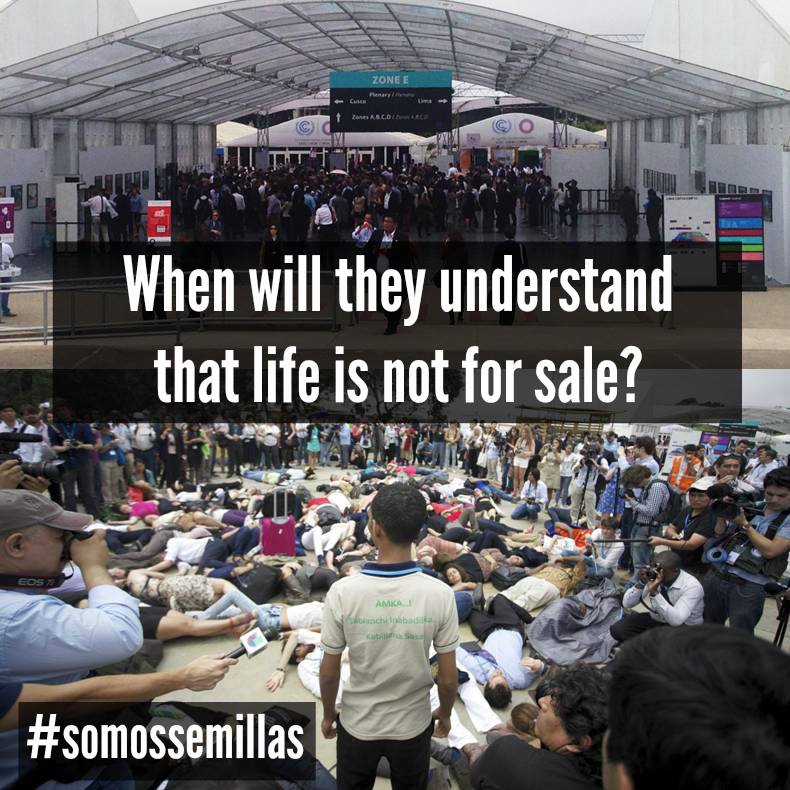As the COP 20 negotiations drew to a close and negotiators argued over amendments to the proposed text, an action calling attention to the devastating effects of climate change was hidden from the eyes and ears of negotiating Parties.
Civil society groups organized a die-in action, led by members of frontline communities in the Global South. As participants laid on the ground, youth from Tanzania, the Philippines, Peru, and the Dominican Republic shared powerful messages about the tremendous climatic impacts their home communities face. Participants created a heartbeat rhythm, tapping palms on chests, and slowly rose up from their metaphorical death beds, singing, “¿Cuándo vas a aprender / Hombre de papel/ Cuándo vas a entender / que la vida no se puede vender?” (“When will you learn / man of paper / when you will understand / life cannot be sold“)
Many tears were shed as Gerry Arances from the Philippines pleaded, “The conference of Parties have failed us for 20 years. And here in Lima they are failing again. The people of Asia, the people in my country, my brothers and sisters in the Philippines, are dying as governments here discuss the fate of my people and the people of this world.”
As we stood, hands on hearts, we asked ourselves: how many of the negotiators here in Lima have cried about the loss of lives and livelihoods already caused by climate change? How many have wept with fear for our collective futures?
Receiving approval for this action was a frustrating process. In an appalling lack of respect and decency, security informed organizers that the die-in would have to move to an isolated location, tucked away far from the incoming negotiators. In doing so, the UNFCCC silenced the voices of youth and people from frontline communities. Does the UNFCCC not believe that these voices merit being heard?
While civil society groups are heavily restricted by the UNFCCC process, fossil fuel companies are given full reign. This dichotomy, which was particularly apparent at COP 20 in Lima, is stark and disheartening. Top UN officials paternalistically encourage civil society to get angry about climate inaction; we are told that our voices and the voices of those we stand beside are welcome. But when we speak up, they advise us to cease and desist. We are told we cannot name the perpetrators of climate crimes. The Canadian Youth Delegation was barred from naming Canada and Prime Minister Harper in our anti-tar sands action, while the UNFCCC forbade our American colleagues with SustainUS from naming the Keystone XL pipeline and Secretary of State John Kerry on the day he spoke at COP 20.
In Lima, no one has had their badge revoked. But de-badging is a tradition at the UNFCCC, sometimes as early as the first day of the negotiations and for such seemingly harmless actions as carrying an unsanctioned banner. This narrative plays into the deeper injustices of the UNFCCC process. The silencing of young people and members of frontline communities is a symbol of an all too familiar narrative. The same thing happens at the negotiating table. Negotiators from the Global South plead for fair, ambitious, and binding commitments, and in response they are often bullied and forced into agreeing to weak, watered-down texts. Even as we write this reflection, a negotiator from Malaysia named colonialism as the reason some countries are left most vulnerable to climate change while others are historically and currently responsible. The negotiator implored, “There is a world out there that is different from your world… There is a disenfranchised world.”
The cry for action runs deep. Every young person on Earth is united by the impending threat of climate change, but for inhabitants of the Global South and frontline communities, climate change is already exacting hellish consequences. These realities seem increasingly isolated from the corporate lobbyists and comfortable bureaucrats of the world’s wealthiest countries who are continually permitted to co-opt the UNFCCC process. This is why we intend to participate within the UNFCCC framework and why we will continue to attend future COPs — to hold Canada accountable and shed light on the realities of the negotiating process and its unjust mechanisms.
The emotions we feel today will only make us stronger. Let it be known that we will not be silenced by the UNFCCC. We will not stop fighting for what is right and for what is just. We will continue to link arms with those who are experiencing the impacts of climate change today, and we will hold accountable those who are responsible for these devastating impacts. The movement is bigger than the walls of the UNFCCC plenary and it is bigger than us. The fossil fuel industry is made wary by divestment campaigns at home. The cost of renewables is dropping. First Nations legal challenges and assertions of land rights are spurring massive opposition to pipelines and tar sands expansion in Canada. Our movements are growing and strengthening as we continue to organize from coast to coast to coast. Together, we can win.
Climate change is the issue of our time. It is entrenched within social movements worldwide. If we do not resolve the climate problems that we have created, the entire world as we know it will descend into climatic and political chaos and — it is time to face this inevitability — violence. We refuse to let this happen for us, for frontline communities, and for future generations. The time to be united is now. United, we are greater than our unique identities and differences. We are greater than the systems that oppress us — the systems that perpetuate a world in which fossil fuel companies reign. We are greater than the forces against us.



